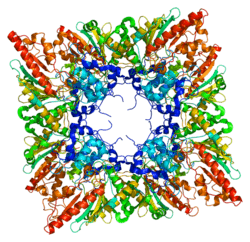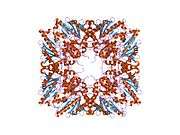CKMT1B
Creatine kinase, mitochondrial 1B also known as CKMT1B is one of two genes which encode the ubiquitous mitochondrial creatine kinase (ubiquitous mtCK or CKMT1).[2]
Function
Mitochondrial creatine (MtCK) kinase is responsible for the transfer of high energy phosphate from mitochondria to the cytosolic carrier, creatine. It belongs to the creatine kinase isoenzyme family. It exists as two isoenzymes, sarcomeric MtCK (CKMT2) and ubiquitous MtCK, encoded by separate genes. Mitochondrial creatine kinase occurs in two different oligomeric forms: dimers and octamers, in contrast to the exclusively dimeric cytosolic creatine kinase isoenzymes. Ubiquitous mitochondrial creatine kinase has 80% homology with the coding exons of sarcomeric mitochondrial creatine kinase. Two genes located near each other on chromosome 15 (CKMT1A and CKMT1B (this gene)) have been identified which encode identical mitochondrial creatine kinase proteins.[2]
Clinical significance
Many malignant cancers with poor prognosis have shown overexpression of ubiquitous mitochondrial creatine kinase; this may be related to high energy turnover and failure to eliminate cancer cells via apoptosis.[2]
References
Further reading
- Payne RM, Strauss AW (1995). "Expression of the mitochondrial creatine kinase genes.". Mol. Cell. Biochem. 133-134: 235–43. doi:10.1007/BF01267957. PMID 7808456.
- Qin W, Khuchua Z, Cheng J, Boero J, Payne RM, Strauss AW (1998). "Molecular characterization of the creatine kinases and some historical perspectives.". Mol. Cell. Biochem. 184 (1–2): 153–67. doi:10.1023/A:1006807515892. PMID 9746319.
- Haas RC, Strauss AW (1990). "Separate nuclear genes encode sarcomere-specific and ubiquitous human mitochondrial creatine kinase isoenzymes". J. Biol. Chem. 265 (12): 6921–7. PMID 2324105.
- Haas RC, Korenfeld C, Zhang ZF, Perryman B, Roman D, Strauss AW (1989). "Isolation and characterization of the gene and cDNA encoding human mitochondrial creatine kinase". J. Biol. Chem. 264 (5): 2890–7. PMID 2914937.
- Stallings RL, Olson E, Strauss AW, Thompson LH, Bachinski LL, Siciliano MJ (1988). "Human creatine kinase genes on chromosomes 15 and 19, and proximity of the gene for the muscle form to the genes for apolipoprotein C2 and excision repair". Am. J. Hum. Genet. 43 (2): 144–51. PMC 1715361
 . PMID 3400641.
. PMID 3400641.
- Jacobus WE, Moreadith RW, Vandegaer KM (1984). "Control of heart oxidative phosphorylation by creatine kinase in mitochondrial membranes". Ann. N. Y. Acad. Sci. 414: 73–89. doi:10.1111/j.1749-6632.1983.tb31676.x. PMID 6584077.
- Brdiczka D, Kaldis P, Wallimann T (1994). "In vitro complex formation between the octamer of mitochondrial creatine kinase and porin". J. Biol. Chem. 269 (44): 27640–4. PMID 7525559.
- Steeghs K, Merkx G, Wieringa B (1995). "The ubiquitous mitochondrial creatine kinase gene maps to a conserved region on human chromosome 15q15 and mouse chromosome 2 bands F1-F3". Genomics. 24 (1): 193–5. doi:10.1006/geno.1994.1604. PMID 7896282.
- Maruyama K, Sugano S (1994). "Oligo-capping: a simple method to replace the cap structure of eukaryotic mRNAs with oligoribonucleotides". Gene. 138 (1–2): 171–4. doi:10.1016/0378-1119(94)90802-8. PMID 8125298.
- Fritz-Wolf K, Schnyder T, Wallimann T, Kabsch W (1996). "Structure of mitochondrial creatine kinase". Nature. 381 (6580): 341–5. doi:10.1038/381341a0. PMID 8692275.
- Bonaldo MF, Lennon G, Soares MB (1997). "Normalization and subtraction: two approaches to facilitate gene discovery". Genome Res. 6 (9): 791–806. doi:10.1101/gr.6.9.791. PMID 8889548.
- Thomure MF, Gast MJ, Srivastava N, Payne RM (1997). "Regulation of creatine kinase isoenzymes in human placenta during early, mid-, and late gestation". J. Soc. Gynecol. Investig. 3 (6): 322–7. doi:10.1016/S1071-5576(96)00043-3. PMID 8923416.
- Suzuki Y, Yoshitomo-Nakagawa K, Maruyama K, Suyama A, Sugano S (1997). "Construction and characterization of a full length-enriched and a 5'-end-enriched cDNA library". Gene. 200 (1–2): 149–56. doi:10.1016/S0378-1119(97)00411-3. PMID 9373149.
- Eder M, Fritz-Wolf K, Kabsch W, Wallimann T, Schlattner U (2000). "Crystal structure of human ubiquitous mitochondrial creatine kinase". Proteins. 39 (3): 216–25. doi:10.1002/(SICI)1097-0134(20000515)39:3<216::AID-PROT40>3.0.CO;2-#. PMID 10737943.
- Schlattner U, Wallimann T (2000). "Octamers of mitochondrial creatine kinase isoenzymes differ in stability and membrane binding". J. Biol. Chem. 275 (23): 17314–20. doi:10.1074/jbc.M001919200. PMID 10748055.
- Schlattner U, Dolder M, Wallimann T, Tokarska-Schlattner M (2002). "Mitochondrial creatine kinase and mitochondrial outer membrane porin show a direct interaction that is modulated by calcium". J. Biol. Chem. 276 (51): 48027–30. doi:10.1074/jbc.M106524200 (inactive 2015-01-01). PMID 11602586.
- Schlattner U, Wallimann T (2002). "A quantitative approach to membrane binding of human ubiquitous mitochondrial creatine kinase using surface plasmon resonance". J. Bioenerg. Biomembr. 32 (1): 123–31. doi:10.1023/A:1005576831968. PMID 11768757.
- Schlattner U, Möckli N, Speer O, Werner S, Wallimann T (2002). "Creatine kinase and creatine transporter in normal, wounded, and diseased skin". J. Invest. Dermatol. 118 (3): 416–23. doi:10.1046/j.0022-202x.2001.01697.x. PMID 11874479.
PDB gallery |
|---|
|
| 1qk1: CRYSTAL STRUCTURE OF HUMAN UBIQUITOUS MITOCHONDRIAL CREATINE KINASE |
|
|

 . PMID 3400641.
. PMID 3400641.